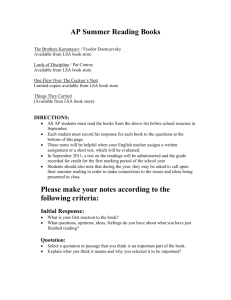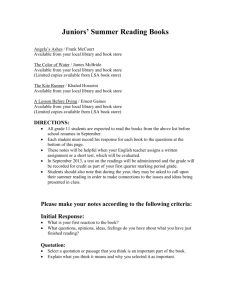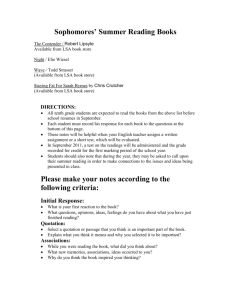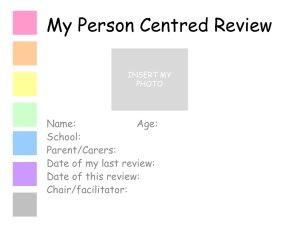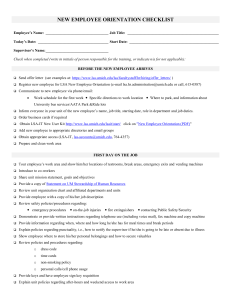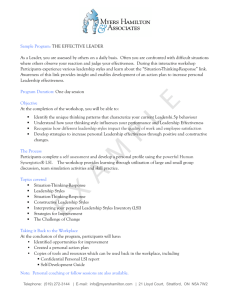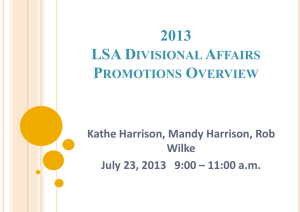Document 13090630
advertisement
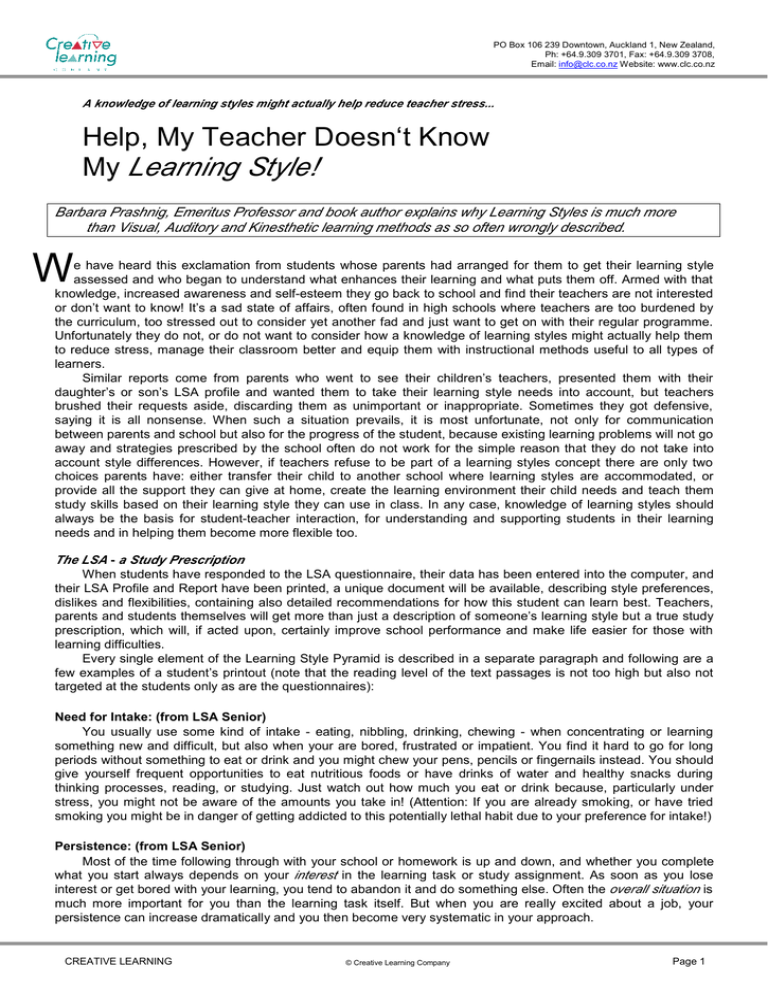
PO Box 106 239 Downtown, Auckland 1, New Zealand, Ph: +64.9.309 3701, Fax: +64.9.309 3708, Email: info@clc.co.nz Website: www.clc.co.nz A knowledge of learning styles might actually help reduce teacher stress... Help, My Teacher Doesn‘t Know My Learning Style! Barbara Prashnig, Emeritus Professor and book author explains why Learning Styles is much more than Visual, Auditory and Kinesthetic learning methods as so often wrongly described. W e have heard this exclamation from students whose parents had arranged for them to get their learning style assessed and who began to understand what enhances their learning and what puts them off. Armed with that knowledge, increased awareness and self-esteem they go back to school and find their teachers are not interested or don’t want to know! It’s a sad state of affairs, often found in high schools where teachers are too burdened by the curriculum, too stressed out to consider yet another fad and just want to get on with their regular programme. Unfortunately they do not, or do not want to consider how a knowledge of learning styles might actually help them to reduce stress, manage their classroom better and equip them with instructional methods useful to all types of learners. Similar reports come from parents who went to see their children’s teachers, presented them with their daughter’s or son’s LSA profile and wanted them to take their learning style needs into account, but teachers brushed their requests aside, discarding them as unimportant or inappropriate. Sometimes they got defensive, saying it is all nonsense. When such a situation prevails, it is most unfortunate, not only for communication between parents and school but also for the progress of the student, because existing learning problems will not go away and strategies prescribed by the school often do not work for the simple reason that they do not take into account style differences. However, if teachers refuse to be part of a learning styles concept there are only two choices parents have: either transfer their child to another school where learning styles are accommodated, or provide all the support they can give at home, create the learning environment their child needs and teach them study skills based on their learning style they can use in class. In any case, knowledge of learning styles should always be the basis for student-teacher interaction, for understanding and supporting students in their learning needs and in helping them become more flexible too. The LSA - a Study Prescription When students have responded to the LSA questionnaire, their data has been entered into the computer, and their LSA Profile and Report have been printed, a unique document will be available, describing style preferences, dislikes and flexibilities, containing also detailed recommendations for how this student can learn best. Teachers, parents and students themselves will get more than just a description of someone’s learning style but a true study prescription, which will, if acted upon, certainly improve school performance and make life easier for those with learning difficulties. Every single element of the Learning Style Pyramid is described in a separate paragraph and following are a few examples of a student’s printout (note that the reading level of the text passages is not too high but also not targeted at the students only as are the questionnaires): Need for Intake: (from LSA Senior) You usually use some kind of intake - eating, nibbling, drinking, chewing - when concentrating or learning something new and difficult, but also when your are bored, frustrated or impatient. You find it hard to go for long periods without something to eat or drink and you might chew your pens, pencils or fingernails instead. You should give yourself frequent opportunities to eat nutritious foods or have drinks of water and healthy snacks during thinking processes, reading, or studying. Just watch out how much you eat or drink because, particularly under stress, you might not be aware of the amounts you take in! (Attention: If you are already smoking, or have tried smoking you might be in danger of getting addicted to this potentially lethal habit due to your preference for intake!) Persistence: (from LSA Senior) Most of the time following through with your school or homework is up and down, and whether you complete what you start always depends on your interest in the learning task or study assignment. As soon as you lose interest or get bored with your learning, you tend to abandon it and do something else. Often the overall situation is much more important for you than the learning task itself. But when you are really excited about a job, your persistence can increase dramatically and you then become very systematic in your approach. CREATIVE LEARNING © Creative Learning Company Page 1 PO Box 106 239 Downtown, Auckland 1, New Zealand, Ph: +64.9.309 3701, Fax: +64.9.309 3708, Email: info@clc.co.nz Website: www.clc.co.nz Mobility (from LSA Junior) You find it very difficult to sit still for long periods of time. Having to sit still and listen to the teacher can be deadly for you. Your concentration improves and your brain works better when you can move your body. You change your body posture frequently, often tapping your feet and fidgeting. You really like to move around while studying, concentrating, listening, even reading. When you are bored, frustrated or under stress, you can become very restless, often agitated - even more so when you have to listen for long periods of time. That’s why teachers will often say you are ‘hyperactive’. To improve your concentration make sure that you are allowed to stand up and stretch regularly, walk around, take a break, and then return to your learning task. Moving while you are learning something new and difficult helps you concentrate. Physical learning activities and games are good for your understanding something new. It is very important that your teachers and parents understand your strong need for mobility. Despite your preference for mobility be aware that not everyone likes to move around as much as you do! There are people who don’t want to be disturbed when they learn, they need peace and quiet. Be considerate. Authority - Teacher/Parent (from LSA Senior) You really don’t like teachers or parents/caregivers checking up on you when you learn. You often do the opposite of what they want you to do, and you would rather stay away from asking their advice whenever you can. In class you always try and sit as far away from a teacher as possible. Find out why you don’t like to have teachers or parents around when you learn, why you don’t trust them or why you are afraid of them. They are actually there to help you with your learning and to support you when you need it. Maybe you can discuss this problem with someone you trust, find out the reason and slowly begin to cooperate a bit more. It will certainly help that your teachers and parents/caregivers understand your style. You’ll find school might be a bit easier for you in future when you accept your teachers’ authority and learn to cooperate. Life at home will be better when you have a good relationship with your parent(s) or caregivers and you all learn to do more things together, particularly homework. It also important that your teachers understand your presently negative attitudes and could help you, if you accept it. Time of Day - Evening (from LSA Senior) You are a night owl! You really come alive in the evening and you can probably get more school and school homework done at night than what you could do during normal hours. If possible, when you don’t have to get up early the next morning, have your reading or study time and you’re demanding assignments which require a lot of concentration during the evening and night hours. Discuss this evening preference with your parents and see if you can do your homework in the evening, as you will learn better and remember longer. Sound (from LSA Senior) You prefer to learn with sound and music! Even noise doesn’t bother you when you read or study - quite the contrary. It helps you to concentrate and you find it very difficult to work in a quiet classroom or home environment. You probably like to hum or whistle and need it buzzing around you while you learn. To enhance your concentration, make sure you have stimulating background noise around you and/or music playing in the background (most effective is classical, baroque or any other instrumental music.) Avoid ‘Heavy Metal’ or loud music with words, particularly when you are reading or working on difficult tasks. Despite your strong need for loud music, be aware that not everyone can bear the same volume! There are people who need it quiet when they concentrate. From these examples educators can see that even if they are not familiar with learning styles and diversity, these detailed reports will certainly give them a good understanding about the learning needs of a young person and will enable them to help their students. But of course, I strongly recommend that you participate in a Learning Styles training programme because there is so much more to learn about this fascinating concept, particularly for principals, teachers or parents of teenagers. EDUCATION TODAY ISSUE 3 2000/TERM 2 Page 14 CREATIVE LEARNING © Creative Learning Company Page 2
